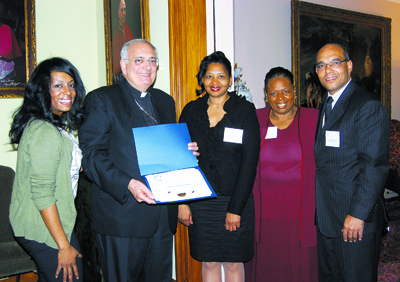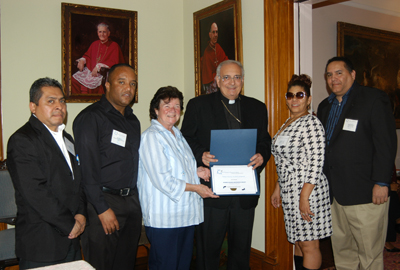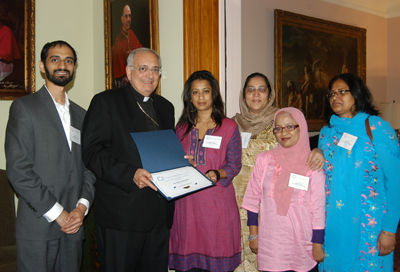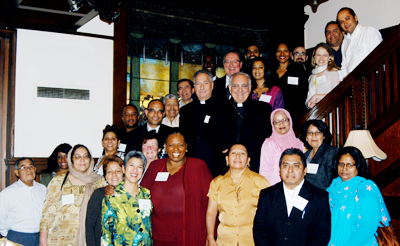Bishop Nicholas DiMarzio held an awards reception Oct. 18 to honor local recipients of this year’s national Catholic Campaign for Human Development (CCHD).
Grant recipients were personally congratulated by the bishop as well as Msgr. Alfred LoPinto, diocesan vicar for human services; Robert Siebel, CEO of Catholic Charities Brooklyn and Queens (CCBQ); Sister Ellen Patricia Finn, O.P., CCBQ deputy executive director, and Nina Valmonte, director, CCBQ parish and community outreach and services.
Founded in 1969 through the efforts of Brooklyn Bishop Francis J. Mugavero, CCHD is the domestic anti-poverty program of the U.S. Catholic Bishops. It provides self-help grants to low-income organizations working to address the policies and systems that perpetuate poverty in their communities. Grantees are selected by a local advisory committee and chosen with the approval of the diocesan bishop. Grants are made possible through the generosity of Catholic lay people, especially those who contribute to their diocese’s annual parish collection.
This year, CCHD in the Brooklyn Diocese is presenting almost $150,000 to four local organizations that address the root causes of poverty and seek to empower the poor and marginalized. The East River Development Alliance is receiving an economic development grant. Community development grants are being given to Desis Rising Up and Moving, Bushwick Housing Independence Project and Centro Hispano Cuzcatlan.

Based in Queens, the East River Development Alliance (ERDA) is a community development credit union providing banking, checking, savings and rent-payment services to low-income families living in three major public housing residences in Long Island City and Astoria. The credit union has over 1,000 members and over $750,000 in assets. Members include parishioners from St. Rita, St. Patrick and Our Lady of Mt. Carmel parishes. ERDA’s future plans include working with the N.Y.C. Office of Immigrant Affairs to help people with citizenship fees.
Preserving existing affordable housing for undocumented residents and low-income families in Bushwick and neighboring Bed-Stuy is the mission of Bushwick Housing Independence Project (BHIP). Formed in response to the community’s growing housing crisis, BHIP teaches tenants how to organize and empowers them to fight against various injustices, including landlord harassment, poor housing quality and illegal evictions.
“Poverty is sinful especially when it’s caused by human greed,” said Sister Kathleen Maire, O.S.F., BHIP executive director. She added that gentrification is a major problem facing low-income families in Bushwick and surrounding areas because landlords are unjustly evicting poor people so they can rent their apartments for more money.

BHIP works to educate people by providing housing court counseling, tenant education seminars, tenant leadership training and other services to nearly 700 families every year. BHIP is also organizing and pushing for a reform of housing court procedures to make them more favorable toward tenants, especially those who cannot speak English and do not have legal representation.
Immigrants from El Salvador founded Centro Hispano Cuzcatlan (CHC) in the basement of Presentation B.V.M. parish, Jamaica, in June, 1998. When the group began, Eduardo Barahona, founder and executive director, said, “CCHD was the first organization to give us seed money to help CHC grow.”

Today, the group assists low-income immigrants from Central and South America in a variety of areas, including workers’ rights, housing and landlord-tenant issues. It recently organized 55 tenants in five buildings in a lawsuit against an abusive landlord.
Immigration issues, particularly the extension of Temporary Protective Status (TPS), is another major area of focus for CHC. The non-profit is also working with a citywide coalition to simplify the state’s division of housing and community renewal’s administrative process, especially for non-English speakers.
Additionally, CHC provides English-language and computer training sessions, workshops on leadership and community organizing and tax seminars. It has also set up an information hotline for Spanish speakers.
“We try to work in a proactive way,” noted Barahona, who works closely with Taylor Guzman, CHC president.
“It’s a never-ending struggle,” Guzman said. “You fix one thing and something else comes up.”
The fourth group, Desis Rising Up and Moving (DRUM), is a multi-generational, membership-led organization working to organize and empower low-income South Asian immigrant workers, youth and families in N.Y.C. to win racial, economic and social justice rights.

Founded in 2000, DRUM works to end racial and religious profiling of South Asians; has mobilized thousands of youth for Congress to pass the DREAM Act; and has taken the lead in successfully reforming the discipline code in public schools citywide so that restorative justice practices replace punitive measures to keep young immigrants in school.
DRUM also offers immigration workshops, computer classes, referrals to free or low-cost attorneys and workers’ rights clinics.
“You’re right on target with the issues here in the City of New York,” – housing, immigration, economic development, Msgr. LoPinto told the grant-winning organizations. He commended them on building skills, learning the system and learning how to operate within the system.
“You are the people that encourage me,” Bishop DiMarzio told the winning organizations, “because you do something to help the community.”
The bishop spoke about his experiences serving as CCHD diocesan director in his home diocese, the Archdiocese of Newark. He also expressed pride in the Diocese of Brooklyn’s long history of helping people help themselves.

